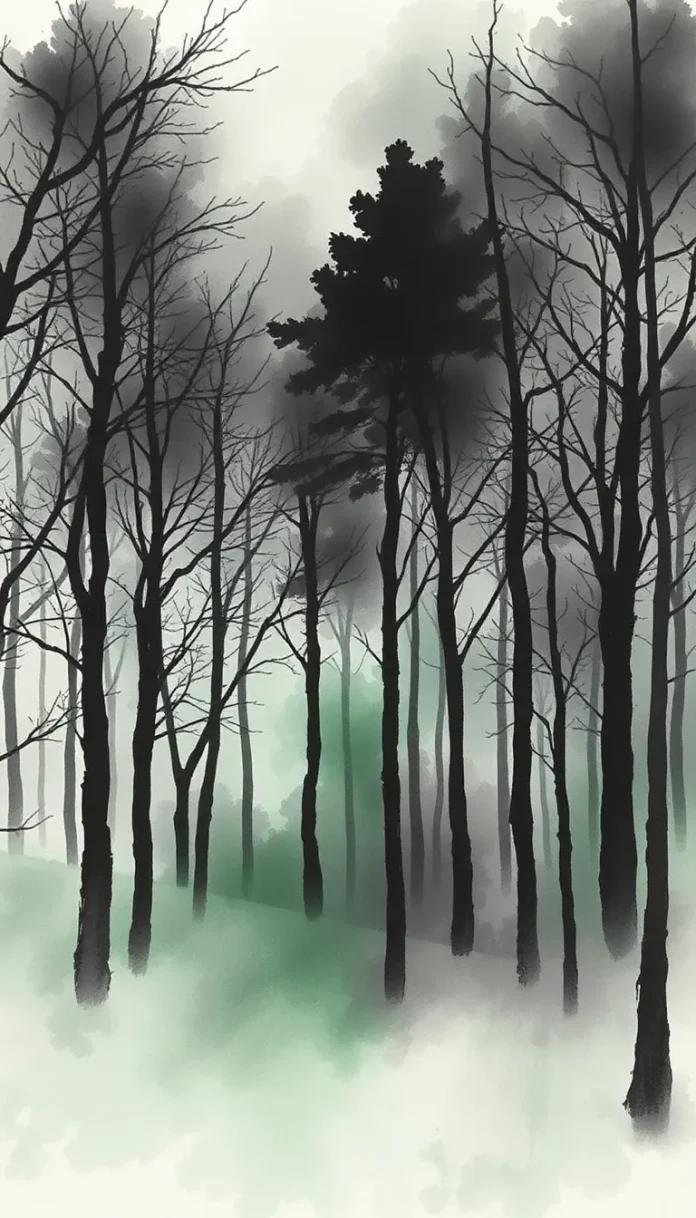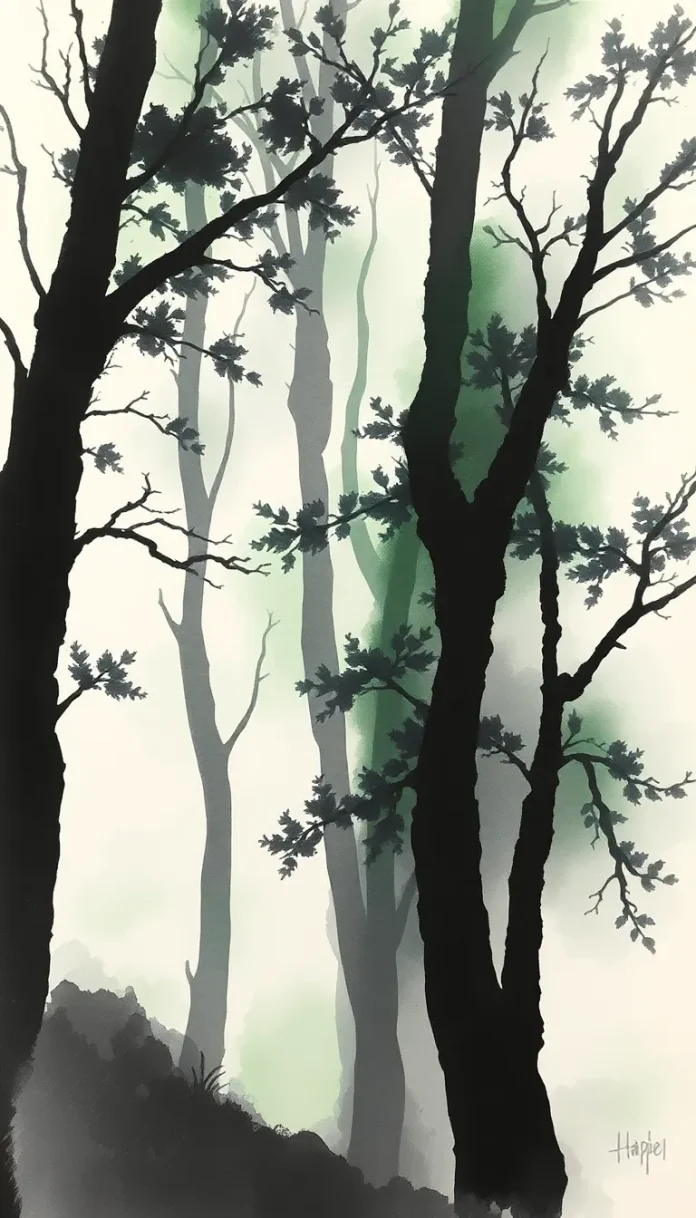Echoes of the Veiled Destiny
Beneath the vaulted rafters, where dust danced in solemn beams of light, the masked actor took his stand. His presence was both mesmerizing and melancholic, drawing eyes to him like moths to the fragile flame of an unquenchable fire. In this hushed sanctuary of forgotten applause, he recited monologues that traversed the labyrinths of the human condition—their sins, their sorrows, and the pervasive sense of impending doom.
“Alas, these weary souls,
Bound by fate’s unyielding hold,
Roam through nights bereft of hope,
In search of some reprieve untold.”
Such were the words that flowed from lips silently veiled; his verse resounded in the cavernous silence of the theatre, echoing amidst shattered remnants of once ornate scenes. The set, with its chipped stones and frayed draperies, became an arena where the eternal drama of life was re-enacted, stirring the hearts of those who found solace in its transient glory. The curtains, edged with time’s caress, ever opened to reveal a world suspended between beauty and decay.
In this hallowed hall of theatrics, time itself seemed to bend under the weight of memory. Each prop, each splintered rail and faded mural, recalled an era of delicate elegance—a time when the starry-eyed and hopeful everyman roamed the twilight of ambitions yet unfulfilled. Yet now, the stage bore the scars of neglect and the quiet insinuation of fatal destiny. The mask he wore was not merely an artifice but a symbol—a monument to the eternal shadow of those who dare to dream while fated to crumble.
There, in a moment of solemn introspection, the Acteur Masqué addressed a lone figure seated amidst the splintered seats of the balcony. A patron of silent suffering, his eyes, like glistening mirrors, reflected the sorrow of eras past and promised the inescapable destiny of mankind.
“Tell me, weary friend,” the masked actor intoned, his voice a blend of tender remorse and quiet determinism, “do you not feel that our souls are ensnared in the inexorable snare of fate? Are we not like these decayed echoes, forever looping in a cycle of ephemeral beauty and unyielding despair?”
The specter replied not with words but with the soft, trembling rustle of a tissue, admiring the delicate inscription of regrets in the audience’s collective heart. In the silent dialogue of shared melancholy, each figure present understood that the theatre itself was a mirror to their own tormented existence.
Through the labyrinthine corridors of the ancient theatre, corridors adorned with the remnants of golden eras, the actor wandered in search of a truth obscured by the relentless mists of time. His steps, measured and graceful, echoed the cadence of his inner soliloquy—each footfall a poignant reminder of mortality and destiny. The worn carpet, bearing countless imprints of former stars, murmured secrets to him; secrets that spoke of aspirations dashed and hearts left to wither in the cold embrace of fate.
Under a solitary chandelier, its crystals fractured like shattered hopes, the masked actor found himself before a grand mirror. In its reflective depths, his masked visage stared back with a profound solemnity—an archive of unspoken desires and silent heartbreak. There, in the reflective gloom, he whispered:
“Ah, visage of my concealed self,
Whence cometh this eternal guise,
Art thou the keeper of my fate,
Or the jailer of my soul’s demise?”
His voice shattered the stillness, and in that fragile moment, the theatre itself appeared to mourn with him. The echoes of his soul reverberated among the broken carvings and faded portraits of forgotten luminaries, as though each piece of the ancient stage bore the weight of its own sorrowful narrative.
The melancholy performances of the Acteur Masqué had become more than a mere spectacle—they were a chronicle of the human condition, an elegy for hopes unrealized and dreams crumbled under the relentless hand of fate. For in his own quiet sorrow, he recognized that every man and woman was naught but a transient character on fate’s indifferent stage, wandering through a labyrinth of ephemeral joys and inevitable despairs.
One eventide, as autumn’s lamenting wind swept through the splintered arches of the theatre, the actor encountered a figure whose gaze bore the quiet intensity of vanished spring. She, a silent muse cloaked in ephemeral shadows, emerged from the backstage obscurity. Her eyes, like distant pools of melancholy water, seemed to mirror the entirety of human sorrow. In their brief exchange, no words were necessary—the language of grief and yearning transcended all speech.
In the language of gestures, as fleeting as the sigh of a ghost, she moved gracefully towards him. Their brief, empathetic union on the dim stage was a poignant emblem of unity in sorrow—a fleeting glimpse of solace in a world overwhelmed by the inexorable currents of fatal destiny. Yet, as quickly as she appeared, the muse receded like the last light of twilight, leaving behind a silence more profound than any soliloquy.
Thus, the Acteur Masqué grew ever more isolated, ensnared by the twin specters of fate and despair. His performances began to reflect a deeper, more fatalistic sentiment. No longer could he feign mirth or conjure joy; his every word, every gesture, was laced with the bitter acknowledgment of mankind’s inevitable descent into sorrow. And so the audience, drawn inexorably to his profound melancholy, found in his art a reflection of their own furtive suffering—a mirror to their unlived dreams and the quiet surrender to destiny.
In the waning days of the season, under the pallid glow of a waning moon, the ancient theatre bore witness to a performance more heart-rending than any before. In the solitude of a near-empty auditorium, the masked actor ascended the creaking stage to deliver his most fervent soliloquy—the tale of a doomed love and the fatal shackles of man’s inescapable plight.
He spoke thus:
“Beneath the veil of night’s embrace,
I wander, ever captive to despair.
Each heartbeat echoes the dirge of fate,
A ceaseless roll of sorrow’s snare.
For in this life, we are but fleeting souls,
Our passions doomed to drown in time,
Submerged in the abyss of privation,
Dissolved like echoes in a forgotten rhyme.”
The echoes of these words resonated within the hearts of the forlorn patrons, igniting a collective remembrance of all that was unfulfilled. The poet could see in their eyes the reflection of his own desolation—a shared recognition of the tragic destiny that gripped them all. The walls of the theatre, steeped in the memories of bygone tragedies, absorbed each word and lent them an enduring presence—a ghostly symphony of sorrow.
Yet, as the performance unfurled its tragic narrative, an inevitable question loomed like an omen over the stage: Was there redemption to be found in the acceptance of fate, or was the human spirit forever condemned to wander a path of incessant despair? In his soliloquy, the masked actor sought not answers but the release that only a profound acknowledgment of one’s own mortality might bestow.
His internal musings were as turbulent as the storm-laden skies above the decaying theatre:
“I, a phantom draped in mortal guise,
Am but a wanderer in the valley of regret.
Each step I take is traced by sorrow,
Each breath a lament of the years unmet.
What solace lies in the silent arms of destiny,
What reprieve in surrendering to the night,
When fate, unyielding, has inked my destiny,
And left me bereft of the dawn’s gentle light?”
In these haunting reflections, his inner turmoil was laid bare—a fragile tapestry woven with threads of passion, loss, and an unremitting melancholy. The cost of human existence, it seemed, was to bear the burden of endless longing and the inexorable realization that all beauty must succumb to decay. His mask, that intricate emblem of concealed anguish, no longer served as a barrier to hide his torment but as a window into the soul of a man surrendered to the inevitability of ruin.
On that fateful evening, as the final act of his performance approached, the actor was confronted by a truth as immutable as the crumbling stones beneath his feet. In a final, heart-wrenching dialogue with his own shadow, he admitted that, in the great tapestry of life, every thread was destined to fray, every note to dissolve into silence.
“Must I, then, be forever ensnared
Within this masquerade of transient art?
Is there no escape from the march of time,
No shelter from the merciless hand of destiny?
Or is it that our souls, in their fragile plight,
Are forever doomed to wander in the abyss of sorrow,
Seeking a glimmer of hope amid desolation,
Yet finding but the echo of dreams long hollow?”
The theatre, in its sorrowful embrace, seemed to weep with him—its every creaking beam and worn relic resonating with the lament of a thousand lifetimes. The audience, though few and few were those who attended this final act, felt their hearts shatter in symphony with his woe. For they, too, harbored the unspoken truth of their own impermanence—a shared destiny marked by the inexorable passage of time and the relentless advance of despair.
In the silent aftermath of the soliloquy, the lights dimmed to an almost ethereal twilight. The masked actor stood alone upon the stage, surrounded by the residual echoes of his art, the tatters of fleeting applause, and the ceaseless murmur of mortal resignation. In that hallowed chamber of suffering, the final curtain beckoned—a somber threshold to the ultimate dissolution of all that he had known.
There, at the edge of that final act, the Acteur Masqué felt his heart, already tethered to the icy chains of fate, succumb to a profound sorrow. In the final moments, as the audience, both present and imagined, merged into one unified lament, he removed his mask—a gesture of both defiant vulnerability and the ultimate surrender to the inevitability of his condition. Behind the ornate façade, his eyes glistened with the mournful luminescence of a soul resigned to its tragic destiny.
“In the surrender of my guise,
I confess the truth of bitter receipt,
That all who wear the mask of mortal dreams
Are bound to crumble, incomplete.
Farewell, ye fleeting specters of ambition,
For in the quiet void of destiny’s breath,
We return, as shadows in the twilight,
To the echo of our ultimate, somber death.”
Thus, with this final utterance, the actor’s spirit dissolved like mist in the cold night air. The ancient theatre, a silent witness to the eternal cycle of rise and decay, absorbed the final sigh of an existence that had long been defined by beauty and sorrow. The worn-out decors, which had once been the stage for mirth and tragedy, now bore only the imprint of a melancholy farewell—a lasting epitaph to a life journey marked by the inexorable grip of fatality, a testament to the human condition in its bare, unadorned truth.
And so it was, beneath the pall of a starless sky, that the tale of the Acteur Masqué concluded in a sorrowful interlude—a somber requiem echoing in the hollow sanctuary of fate. In the dwindling light, the ancient theatre, with its time-worn scenery and weary relics, became the final resting place of a spirit whose luminous passion was fated to be eternally eclipsed by the inexorable march of destiny. The masked actor, now but a memory, had left behind a legacy steeped in the bittersweet lamentations of life—a narrative as transient as the dewdrops upon a withered rose, as enduring as the quiet sorrow that lay at the heart of every mortal soul.
In that final, tragic moment, as the once resplendent stage faded into mere echoes, the audience, too, departed with a heavy, immeasurable grief—a silent acknowledgment that in every joy there exists an inevitable sorrow, and in every breath of hope, a prelude to despair. The ancient theatre, an eternal relic of fabled dreams and somber realities, whispered its final elegy to the night. For in the play of life, every brilliant ray must eventually yield to the relentless darkness, leaving behind only the poignant memory of what once was, and the eternal sorrow of a destiny unfulfilled.


